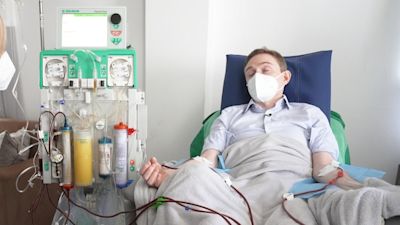Long Covid patients urged to only access treatment through regulated clinical trials

Long Covid patients are being strongly advised to only access treatment for the condition through regulated clinical trials rather than travelling abroad, the Department Health and Social Care told ITV News.
The statement comes following a joint exclusive investigation between ITV News and the British Medical Journal (BMJ), which found thousands of people with Long Covid symptoms are spending life-changing sums of money on invasive and unproven treatments in private clinics abroad.
Patients are travelling to private clinics in Cyprus, Germany and Switzerland for apheresis “blood washing”, blood thinners and anti-clotting drugs.
But experts question whether these invasive therapies should be offered without sufficient evidence.
Apheresis is a blood filtering treatment normally used for patients with lipid disorders that have not responded to drugs.
The treatment involves needles being put into each arm and the blood is passed over a filter, separating the red blood cells from the plasma. The plasma is filtered before being recombined with the red blood cells and returned to the body via a different vein.
People have travelled abroad to clinics such as The Long Covid Centre in Cyprus for the treatment, including Gitte Boumeester, a trainee psychiatrist from the Netherlands, who, after catching the virus, developed severe Long Covid symptoms.
She was forced to quit her job in November 2021 after two failed attempts to go back to work, and learnt of the “blood-washing” treatment of apheresis from a Facebook group for Long Covid patients.
Want a quick and expert briefing on the biggest news stories? Listen to our latest podcasts to find out What You Need To Know
Ms Boumeester spent more than €15,000 (£12,675) on the treatment but returned home with no improvement to her symptoms.
She was asked to sign a consent form at the Long Covid Center before undergoing apheresis, which lawyers and clinicians described as inadequate.
Marcus Klotz, co-founder of the Long Covid Centre said: “We as a clinic do neither advertise, nor promote.
"We accept patients that have microcirculation issues and want to be treated with HELP apheresis…If a patient needs a prescription, it is individually assessed by our doctor or the patient is referred to other specialised doctors where needed.”
Professor Beverley Hunt, a blood disorder specialist and medical director of Thrombosis UK, told ITV News there are medical risks that come with apheresis. “You could introduce infection, you could cause metabolic upsets, you might need additional magnesium and calcium,” she says.
Similarly Shamil Haroon, clinical lecturer in primary care at the University of Birmingham and a researcher on the Therapies for Long Covid in Non-hospitalised patients (TLC) trial, believes such “experimental” treatment should only be done in the context of a clinical trial.
“It's unsurprising that people who were previously highly functioning, who are now debilitated, can't work, can't financially support themselves, would seek treatments elsewhere,” he says.
“It's a completely rational response to a situation like this. But people could potentially go bankrupt accessing these treatments, for which there is limited to no evidence of effectiveness.”
In February of 2021 Dr Beate Jaeger, an internal medicine doctor, began treating Long Covid patients with apheresis at her clinic in Germany, after reading reports that Covid causes issues with blood clotting.
Dr Jaegar accepts that the treatment is experimental for Long Covid, but said trials take too long when the pandemic has left patients with debilitating symptoms.
The North Rhine Medical Association, which examines whether doctors have violated their professional code of conduct, said it has not received any complaints about Jaeger or her clinic from patients or other organisations but will investigate if it does.
Existing research has suggested that "microclots" present in the plasma of people with Long Covid could be responsible for Long Covid symptoms.
But experts contacted by The BMJ and ITV News said more research is needed to understand how microclots form and whether they are causing Long Covid symptoms.
Others are also concerned about the lack of follow up care for patients when they leave clinics after being prescribed anticoagulation drugs.
Robert Ariens, professor of vascular biology at the University of Leeds School of Medicine, said: “They [microclots] may be a biomarker for disease, but how do we know they are causal?”
He believes the clinics offering apheresis and anticoagulation therapy are prematurely providing treatment based on a hypothesis that needs more scientific research.
“If we don’t know the mechanisms by which the microclots form and whether or not they are causative of disease, it seems premature to design a treatment to take the microclots away, as both apheresis and triple anticoagulation are not without risks, the obvious one being bleeding,” he adds.